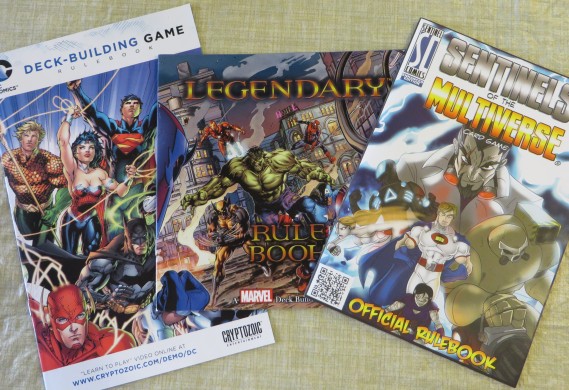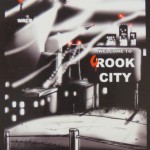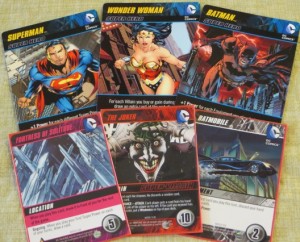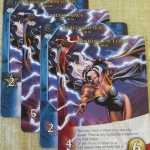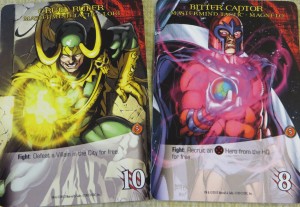Legendary vs. DC Deck-building Game vs. Sentinels of the Multiverse: A Comparison
From about 2006 to 2012 I was largely absent from the gaming scene. I was primarily a CCGer and there just wasn’t much that interested me at the time. Besides, I was busy paying bills, getting married, and doing other things that took financial priority over games. Truth be told, I hated the CCG model and new it was too expensive in both time and money requirements for me to be involved with it the way I would want to be. It was around this time that a friend of mine opened a game store and introduced me deckbuilders in general, and Ascension specifically. This kicked open the door (Munchkin reference – GO UP A LEVEL!) to gaming for me once again in ways I hadn’t yet imagined and showed me that quality gaming was now affordable and accessible!
I enjoyed the concept and mechanics of Ascension very much, but something kept pushing me away from it – the art. I just couldn’t swallow the artistic stylings of the game, and the mechanics weren’t good enough to overcome the cognitive dissonance over the pictures. With that in mind, I set about to find deck-building alternatives and eventually settled on both the DC Deck-building Game by Cryptozoic Entertainment and Legendary by Upper Deck. It wasn’t too much longer after I opened these games that I knew I had found my home for the foreseeable future! There are some things I wish I had known about the games before I bought them, though, that may have saved me a few bucks in the long run. Add on top of that the Sentinels of the Multiverse (hereafter refered to simply as Sentinels) card game by Greater Than Games, and an investigative shopper has some real choices to make – it’s not a deck-builder, but Sentinels is still very much a comic-based deck game and is worth a look.
In the following paragraphs I’ll discuss these three prevalent comic card games, ranking them in assorted areas when appropriate, and simply comparing/contrasting them when rankings aren’t befitting of a particular trait. There will be no overall ratings of games at the end – this is not intended to be a review of individual games; and, to be clear, none of them are bad games whatsoever. Instead, this is more of a buyer’s guide or preview to help you decide which of the three might fit you the best.
Art is what led me to seek alternatives to Ascension in the first place, so this is where the comparisons begin. Lowest marks go to Legendary, and it’s not close. The problem here isn’t so much with the art quality, but rather the quantity. Every card in each superhero deck uses the same image. Just one! The lack of variety is simply unacceptable given how many images are available for Thor, Wolverine, and the rest of the hero cast. Your deck isn’t made up of just heroes, of course, so you do see some image variety in your deck, but it’s quite limited. Additionally, the font can be hard to read against certain colors in the background.

Cards from Sentinels of the Multiverse, including Legacy and his alternate universe self, the villainous (and brutally difficult to defeat) Iron Legacy
Coming in second is Sentinels. The art style here is slightly retro compared to the other two, reminding me of comics from about 15 years ago instead of today, with each of the hero deck title cards featuring the hero as if on a comic cover. Each hero deck gives you around twelve to sixteen different images, each villain deck features roughly eight images, and there’s about five in each location deck. Plus, each location deck has a unique, distinct card back befitting of its theme. For added variety, the settings of the heroes and locations cover a wide spectrum of times and locations. These range from the Old West in the 1800′s to different universes in the future, and everything in between. Quite a lot of artistic bang for the buck.
The nod for top art honors goes to DC. Although Sentinels provides more variety in any given game, DC’s overall art quality is the best. The images are sharp and feel completely modern, and each image chosen feels appropriate for the card title and/or effect. Furthermore, because the DC characters are known, art and brand recognition helps to draw people into the game rather than make people think to see if they’ve seen the characters before (as with Sentinels).
Sentinels has the players acting as a team to defeat a central villain. Just because Sentinels is a co-op game, though, doesn’t mean it’s all bubblegum and carebears! To be clear, the game hates you from turn 1, and just when you think the team has weathered the storm, it hates you more. Sometimes doing just a single point of damage against a villain with 100 health is a small victory. It really feels like the end boss of a co-op video game. Difficulty varies by boss and team composition, and ranges from, “Whew, that was kinda tough!” to “Excuse me, sir…I’m having trouble seeing. Can you help me remove this spear from my eye socket?” The mechanics are relatively simple – play a card, use a power, and draw a card – and the villain and environment decks play themselves. Unfortunately, the Sentinels game is attached to a proprietary IP – albeit an entertaining and engaging one, particularly if you read the character and villain bio’s in the rulebooks – and this can make it difficult for some players to dive into.
While not quite as punishing, Legendary also fairly well captures the sense of a save-the-world situation in a card game, and there are definitely twists and turns to be dealt with as the game progresses. The characters are
immediately recognizable due to the bevy of Marvel movies having come through the theaters lately, let alone their decades of quality comics. There are two potential barriers to entry with Legendary, though – mechanics, and setup. The mechanics aren’t overly difficult, but since many people are still new to the deckbuilding concept and the game uses a number of unique symbols and resources, fledgling hobby gamers may need a little extra time to get used to the game. What’s far worse, though – and this is the reason I haven’t played Legendary since after the first day I opened the box – is the setup and storage of the game. There are soooo many piles of cards to sort through, and you need a small chart just to know how many cards to use in the first place. When people want to play games, they want to play *the game*, not play setup. Thunderstone might be the worst deckbuilder when it comes to setup. Legendary isn’t too far behind it.
DC is the lightest on theme. The characters are mostly recognizable and the IP has been around since long before the current generation of gamers was born, but beyond the Street Fighter variant of the DC game (all non-Lord of the Rings variants are part of the Cerberus Heroes engine and can be played interchangeably), none of them have a strong sense of bringing you into Metropolis, Gotham, or other familiar setting. The complexity of mechanics in the DC game falls between Sentinels and Legendary, but they’re meaty enough to make you think a little bit while purchasing and playing cards. It is definitely the lightest of the three in regards to stress, and I consider it a gateway game to deck-building games, and hobby gaming at large, as it will give you a sense of what new players like in a game and what they can handle regarding rules complexity.
Although Sentinels requires strategy and teamwork to down the boss, it has the least amount of strategy involved within each individual deck since all the decks are pre-built. There are some exceptions to this – Absolute Zero comes to mind – but in most situations there’s not a lot of difficult decisions, planning, or scheming involved within the deck. The team is primarily reacting to the cards that the villain and environment decks throw at them, and you’re largely at the mercy of the cards you draw to deal with those challenges. Even the base mechanic of play-power-draw is fairly limiting outside of a few combos. Keep in mind that this isn’t a heavy knock against the game – the design of the game is such that it emphasises teamwork and communication over heavy individual strategy.
DC takes 2nd place in the strategy race. There are a number of variables that can impact card purchases, and there are a number of card interactions that require cards to be played in a certain order to maximize their synergy. Some of the First Attacks on the super villains feel a little arbitrary and unnecessarily punishing at times, but even those can be “planned” for with sufficient Defense cards in your deck. It also helps to be mindful of other players’ likely strategies based on their superhero choice and prior card selections. If the player after you is Batman and there’s an equipment card you can buy, that’s rarely a bad idea. If it has a Defense ability on it, all the better.
Legendary is easily tops in the strategy among the three games, and is the only one that is strategic enough to lend itself to competitive play. Effective management of the dual resource system, deciding whether or not to heal wounds, and leveraging your knowledge of the hero deck composition and team icon interactions all help determine outcome of the games besides just the order of card play and luck of the hero/villain decks. Nobody will confuse Legendary for Magic or Chess when it comes to strategy of building your deck or gameplay execution, but it certainly stands atop of the superhero card game pile.
I’m primarily judging on card and ink quality here. None of the games rate poorly in this regard, however there are definite differences. Sentinels has the heaviest card stock by far (Note – I’m referring to the Enhanced Edition of Sentinels; the first printing used stock similar to a My Little Pony card and simply wasn’t very sturdy at all), and is the only one of the three I would consider playing without sleeves. The thickness, however, leads to slightly stiff shuffling and the feeling of rough edges/burrs on some cards which more sensitive players may find distracting. Additionally, the card faces themselves feel a little grainy. The other two games use card stock that is more similar in thickness to standard Bicycle playing cards. The DC cards sometimes have slightly rougher edges on them – particularly the superhero cards, but overall have a great feel. Legendary cards seem to have the best edges and finish on the faces. If I had to choose a winner here, it would be Legendary, but not by much. If I was strictly going on longevity then it would be Sentinels, though – for as much as I play the games, I highly recommend sleeves for DC and Legendary.
None rate poorly here since all the games have a selection of superheroes and villains to rotate through, and deck variance plays a factor in all three games. That being said, DC definitely is the laggard in replay value. While there are sufficient superheroes to help ensure a consistently refreshed mix of base strategies on the table from game to game, and you never know which super villains you’ll face nor the order that they’ll appear, the draw deck is static. The only way to change the draw deck from game to game is to include cards from expansion sets. With both Legendary and Sentinels, all aspects of the game can be changed from session to session. Legendary and Sentinels also both have enhanced game modes with the villains now – the former via the Villains expansion, and the latter via the Vengeance expansion.
All of these games could be worthy of a space in your game closet, but you want to make sure that the games fits your preferences. If you like co-op games, then Sentinels is definitely the one for you. With a total of more than twenty hero decks to play, eighteen villains, and fourteen locations, there is enough variety in material and complexity to keep you and your friends coming back for months. If you prefer a heavy thematic presence then Sentinels or Legendary might be the way to go to really get the feeling like you’re in their world. If you prefer accessibility over all then DC will have you up and running in the shortest amount of time and having fun all night – it’s the easiest to set up, take down, and finishes in 30-60 minutes. Or, if you’re into that whole setup-and-takedown thing (weirdo), then Legendary is DEFINITELY for you.
← Game Review: Dixit
-
Kiefer Fairbanks

